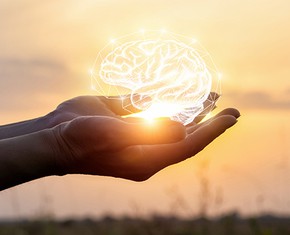The views expressed in our content reflect individual perspectives and do not represent the authoritative views of the Baha'i Faith.
…man’s supreme honor and real happiness lie in self-respect, in high resolves and noble purposes, in integrity and moral quality, in immaculacy of mind. – Abdu’l-Baha, The Secret of Divine Civilization, p. 18.
Strive as much as ye can to turn wholly toward the Kingdom, that ye may acquire innate courage and ideal power. – Abdu’l-Baha, Selections from the Writings of Abdu’l-Baha, p. 206.
Quick: when you think about courage and bravery, what image immediately comes to mind?
Do you envision a lone soldier charging his enemy, or a policeman battling a criminal, or a superhero trying to save the world from alien invaders?
Unfortunately, the portrayals of heroism and valor in our contemporary culture tend a little toward the melodramatic. Modern entertainment usually portrays heroic acts as lone attempts at physical bravery from muscular men, accompanied by lots of gunfire and explosions.
Spiritual courage goes much deeper and much farther.
Positive psychology’s Character Strengths and Virtues handbook defines courage with a listing of four attributes, including one expected synonym and three particularly unexpected ones: bravery, persistence, integrity, vitality.
Courageous people don’t just perform heroic acts once in a while—they persist in their altruistic efforts, with integrity and energy.
Think of Mahatma Gandhi or Wangari Maathai or Dr. Martin Luther King, Jr. Each of them had courage, facing enormous opposition and attempting to fight an entrenched social evil. But the true courageousness in their long struggles against colonial or environmental or racial injustice came not so much in individual, momentary acts of heroism; but instead in their long-term commitment to their causes. They persisted, with integrity and vitality, and those human qualities and attributes allowed them to push aside huge difficulties.
These kinds of qualities don’t come from the intellect—many very bright people lack courage. These kinds of qualities don’t come from social position or class or power—instead, they often rise up out of deprivation and poverty. These kinds of qualities don’t happen randomly—the people who develop their courage, persistence and integrity have to work on it, often turning experiences of injustice into a drive for a more just society.
These qualities, then, are chiefly moral attributes. They reside in the spiritual reality of every human being, rather than their mental or physical traits. They come from the heart and the soul first, and then through the mind and the mentality and the demeanor of each person. They come from deep within our inner character:
The most vital duty, in this day, is to purify your characters, to correct your manners, and improve your conduct. …the purpose of the Manifestation of God and the dawning of the limitless lights of the Invisible is to educate the souls of men, and refine the character of every living man — so that blessed individuals, who have freed themselves from the murk of the animal world, shall rise up with those qualities which are the adornings of the reality of man. The purpose is that earthlings should turn into the people of Heaven, and those who walk in darkness should come into the light, and those who are excluded should join the inner circle of the Kingdom, and those who are as nothing should become intimates of the everlasting Glory. It is that the portionless should gain their share of the boundless sea, and the ignorant drink their fill from the living fount of knowledge; that those who thirst for blood should forsake their savagery, and those who are barbed of claw should turn gentle and forbearing, and those who love war should seek instead for true conciliation; it is that the brutal, their talons razor-sharp, should enjoy the benefits of lasting peace; that the foul should learn that there is a realm of purity, and the tainted find their way to the rivers of holiness. – Abdu’l-Baha, Selections from the Writings of Abdu’l-Baha, pp. 10-11.
This beautiful passage from the Baha’i writings suggests that we can alter our own characters, our morals and our ethics, consciously striving to become better beings. In the next essay in this series, we’ll take a look at how that might be possible.

















Comments
Sign in or create an account
Continue with Googleor